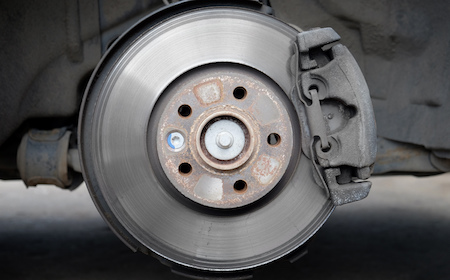Winter in Colorado means snow. A lot of snow. Historically, Denver will receive around 55 inches of snow each winter season. And if you’re not prepared for it, you will pay the price.
For drivers, that means having a car that’s ready for anything. From icy roads to snowpack several inches deep, the last thing you need on your commute is to worry about your safety.
That’s why it’s the most important time of the year to ensure your brakes are properly maintained. Poor brake maintenance not only puts your safety at risk, but it also decreases performance and longevity of the system overall. Your car is an intricate series of parts that work together. When one part is off, it can throw everything else into chaos as well.
With your brake system, it’s important to be proactive with maintenance. Your car’s manufacturer should have a recommended brake maintenance schedule. It may even come with a dashboard warning signal, letting you know it’s time for brake servicing. A good rule of thumb is:
- Check your brake pads at 12,000 miles
- Replace brake fluid at 25,000 miles
These estimates depend both on what car you drive as well as your driving style. By letting experts look at your system, they can help you make an informed decision to keep you safe no matter what the weather is like outside.
What does brake system maintenance mean?
Check your brake pads and rotors
The brake pads and rotors are the two main parts of your braking system. They are also the two main points of contact between your braking system and your tires. Because of their action during braking and stopping, they will deteriorate faster than other parts of your brake system.
When you press down on the brake pedal, it’s connected mechanically to a metal rod that feeds into a device called the master cylinder. A master cylinder is filled with brake fluid, or hydraulic fluid. The master cylinder and your car’s calipers are connected by brake lines. This is how the brake fluid flows through your brake system.
Pressing down on the brake pedal starts the braking process. The metal rod acts as a piston inside the master cylinder, compressing brake fluid to build up pressure inside the braking system. This pressure is transferred into the brake lines, forcing the brakes to move into action.
Behind each wheel is a caliper. Think of it as a big clamp that pushes the brake pads against the rotor, causing friction as it slows down your car. Your brake pads are under a lot of pressure as they slow and stop your vehicle over and over again each time you drive. Eventually, that process wears down. If you notice your pedal moves closer to the floor as you apply pressure, or smell a burning odor, it’s time to check your brakes.
Flush your brake fluid
Every time you press your brake pedal down, brake fluid is released and transferred from the master cylinder to the brake lines, into the calipers, and finally to the brake pads and rotors. Without brake fluid, this process wouldn’t work the way it does.
However, because brake fluid is an integral part of the braking process, it’s important for it to be in good working condition. Over time, it can start to break down. It can attract moisture, which is destructive to your braking system. It can cause corrosion to all metal components, as well as reduce how well the brakes work.
A brake flush is a process of removing brake fluid from the vehicle and replacing it with clean fluid. This removes all of the old fluid and adds new in its place. This will improve the performance of your car, as new fluid will come with a chemical structure that improves the way your braking system will work.
Bleed the brakes
While flushing the brake fluid through the brake line will add new fluid to your car, you should also bleed the brake lines to remove excess air. Over time, small amounts of air can be trapped, causing brakes to feel spongy when pressure is applied to the brake pedal.
As brake pads wear down, their composition can allow small amounts of air inside the braking system. It’s also possible for the brake lines to let in air. If you are an aggressive driver always slamming on the brakes, this can lead to air penetrating the brake lines.
Bleeding the brakes is the process of removing air from the brake line. This ensures the brakes are in good working condition and will work every time you press down on the brake pedal.
Upgrade as necessary
Over time, your brake system will continue to wear. Likewise, technology continues to increase the quality of brake parts, improving both performance and safety factors. This is a constant give and take process, one that should be adhered to on a regular schedule.
When you take the “wait and see” approach, you’re more likely to face expensive repair bills, have your car break down when you least expect it, and put you at more risk for accidents. Scheduling is the key to ensuring your vehicle always runs at its very best.
Become a better driver
One of the best ways to ensure your braking system is always in good condition is to pay more attention to how you drive. Brakes tend to fail more when you exceed what your vehicle is capable of. Things like:
- Carrying large or heavy loads
- Heavy braking
- Aggressive driving
- Driving in poor weather
Any of these can degrade your brakes to the point of having them fail on you when you least expect it. And that puts you and those around you at greater risk.
Your brakes are your safety net on the road. When in doubt, have them checked. It’s the best way to keep them in good working condition all year long.

